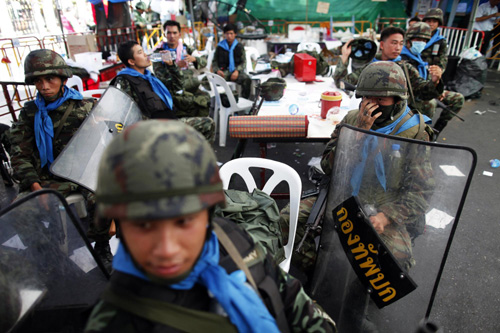-
News >World
Peace returns to Bangkok, but trouble looms
2010-05-21 06:56BANGKOK ?- Order is returning to Bangkok after nine weeks of the worst political violence in modern Thai history, but more clashes or a larger insurrection loom ahead unless authorities quell anger at the heart of recent protests.

Thai soldiers rest at what used to be the VIP area of the now abandoned anti-government "red shirt" encampment in central Bangkok May 20, 2010. [Agencies]?Without major reforms to a political system protesters claim favours an "establishment elite" over the rural masses, this week's bloody dispersal of protesters occupying Bangkok's commercial heart won't end a polarising political crisis and could add fuel to the fire.
The "red shirt" protest movement's figurehead, former Prime Minister Thaksin Shinawatra, a graft-convicted billionaire ousted in a 2006 coup, said the army's tough dispersal of protesters could spawn guerrilla warfare.
Analysts say he may be right."The suppression of the demonstrations does not in any way end the movement, or at least the sentiments and patronage networks behind it," said Duncan McCargo, a University of Leeds professor of Southeast Asian politics.
But after more than two months of unrest that has killed 81 people and wounded more than 1,800, most expect a lull in the violence as the protesters regroup. Its leadership, run by a trio calling themselves the "three stooges" -- adopting a name given them by the government -- has fragmented with most in custody.
In Bangkok, where their festive, flag-waving rallies in March began to win over middle classes, the red shirts are now reviled after their six-week occupation of the city's commercial heart culminated in a night of arson that terrified the city of 15 million people and destroyed property worth millions of dollars.
Residents gasped and some cried as television footage showed Central World, Southeast Asia's second-biggest department store, gutted and nearly destroyed in smouldering ruins.
But in the heartlands of the north and northeast, a Thaksin stronghold home to just over half of Thailand's 67 million people, images of Bangkok burning drew cheers -- an unleashed violence that including the storming of the governor's house in Chiang Mai, the region's largest city.
That's why Thai Prime Minister Abhisit Vejjajiva and his royalist backers should worry, analysts say.
"The people in the provinces aren't likely to shed any tears for the fact that some rich punk in Bangkok can no longer shop at Central World, when dozens of people 'like them' lay dead at the hands of the government," said Federico Ferrara, a political science professor at the National University of Singapore.
"There could be a bit of a lull in their activities now, but I would expect that if the government keeps their leaders in jail, it won't be long before this turns into another cause celebre," he added.
RURAL DISCONTENT
The high-profile arrest of the protest leaders, some accused of terrorism by the government, could embolden the movement over the longer term by playing to their argument they are victims of double standards in a society that favours the elite.
Laying siege to an area to dislodge governments has become a way of life in Thai politics. In 2008, yellow-shirted protesters who opposed Thaksin's allies in the previous government occupied the prime minister's office for three months and then blockaded Bangkok's main airport until a court expelled the government.
Instead of going to jail, one of the figures of that movement, Kasit Piromya, went on to become foreign minister.
Cases like that are at the heart of the discontent among the rural and urban poor in a country where?the richest 20 percent of the population earn about 55 percent of the income while the poorest fifth get 4 percent.
"Not much has changed in terms of the support for the red shirts' among parts of the population. They rioted last year and it turned into a much worse riot this year. That shows the underlying problem remains and has not been addressed by those in power," said Thitinan Pongsudhirak, a political scientist. "But without a strong central leadership, it's going to be difficult for them to regroup any time soon," he said.
"The radicals will likely go underground. The organisation may keep going in the provinces led by their own regional leaders who have their own news outlets and their own views on what's going on."
A bigger question is why is this all happening now.
While there are many factors, providing a complete answer is difficult in a country where discussions of its most powerful institution are off limits due to strict lese majeste laws.
But 82-year-old King Bhumibol Adulyadej, the world's longest-reigning monarch and the country's sole unifying figure, has been hospitalised since September 19, maintaining a very low profile and not commenting on the current crisis.
King Bhumibol's son and presumed heir, 57-year-old, Crown Prince Vajiralongkorn, does not yet command his father's popular support, raising concerns about succession in the influential Thai monarchy, a traditional source of stability.
Some political analysts say both sides in Thailand's polarised political climate are starting to manoeuver for position in the event of possible changes ahead.
